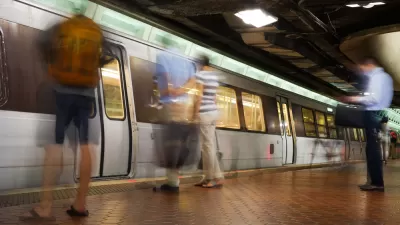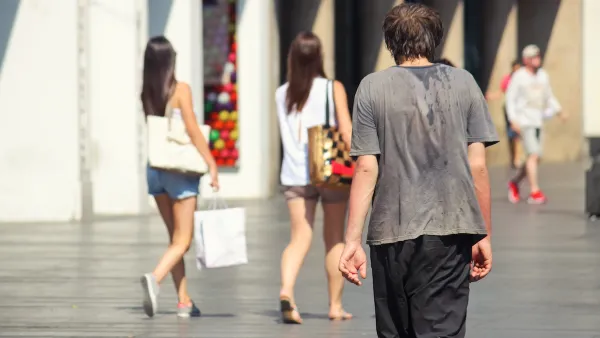Reflecting on the significance and impact of Superstorm Sandy, Bill McKibben and Lawrence J. Hanley propose a 3-step process focused on mass transit that America should pursue to promote community development, public health and the environment.
For McKibben and Hanley, Hurricane Sandy has made it clear that politicians can no longer push climate change under the rug. Climate change contributes to rising sea levels and record heat waves, and the implications of these phenomenon are more apparent that ever before. For one significant place to tackle carbon emissions, they point to the transportation sector, and its role in contributing to 27 percent of total U.S. greenhouse gas emissions. That's not the only way in which our auto-reliant lifestyles are harming the country. "The transport sector," they say, "contributes 80 percent of the harmful air pollutants that cause 1.3 million premature deaths each year. Road fatalities claim 33,000 lives per year on average, making traffic accidents the number one killer of people under 34 in the U.S. And traffic congestion is known to elevate stress levels and reduce quality of life for millions."
On the other hand, explain McKibben and Hanley, data from a recent poll conducted by the Natural Resources Defense Council suggests that Americans are ready and willing to use public transportation and that they want to be less car dependent. However, they are often confronted with obstacles including what many believe are "outdated, unreliable and inefficient" public transportation systems across the country. The 3-steps they propose to address these matters includes: (1) stopping the budget cuts on public transit, (2) redirecting federal investments to expand and improve transit systems, and (3) making transit free or less costly by reallocating fossil fuel subsidies.
In conclusion, they warn that Hurricane Sandy was a “harbinger of what the future will bring” with continued global warming, and articulately state that “[w]hen Sandy flooded New York's subways, it brought the city to a halt. Re-opening the system was a challenge -- but the real challenge is bringing mass transit to a nation that very much wants it.”
FULL STORY: Think About the Transportation Sector

Maui's Vacation Rental Debate Turns Ugly
Verbal attacks, misinformation campaigns and fistfights plague a high-stakes debate to convert thousands of vacation rentals into long-term housing.

Planetizen Federal Action Tracker
A weekly monitor of how Trump’s orders and actions are impacting planners and planning in America.

In Urban Planning, AI Prompting Could be the New Design Thinking
Creativity has long been key to great urban design. What if we see AI as our new creative partner?

King County Supportive Housing Program Offers Hope for Unhoused Residents
The county is taking a ‘Housing First’ approach that prioritizes getting people into housing, then offering wraparound supportive services.

Researchers Use AI to Get Clearer Picture of US Housing
Analysts are using artificial intelligence to supercharge their research by allowing them to comb through data faster. Though these AI tools can be error prone, they save time and housing researchers are optimistic about the future.

Making Shared Micromobility More Inclusive
Cities and shared mobility system operators can do more to include people with disabilities in planning and operations, per a new report.
Urban Design for Planners 1: Software Tools
This six-course series explores essential urban design concepts using open source software and equips planners with the tools they need to participate fully in the urban design process.
Planning for Universal Design
Learn the tools for implementing Universal Design in planning regulations.
planning NEXT
Appalachian Highlands Housing Partners
Mpact (founded as Rail~Volution)
City of Camden Redevelopment Agency
City of Astoria
City of Portland
City of Laramie




























